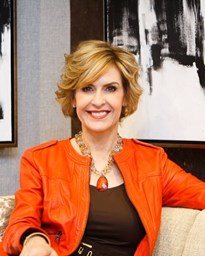Kay Hunter, an image consultant, says a strategic personal brand can make a significant difference in whether a woman will attain personal and professional success. After working in “corporate America” for 18 years, she left her role as a senior vice president for human resources to establish Kay Hunter Image and help women develop a professional presence so they won’t be overlooked for bigger and better roles. Hunter, who will be the keynote speaker at The 3rd Annual RISE National Women in Health Care Leadership Summit, April 29-30, in San Diego, talked to RISE about how women can best develop their personal and professional image.

 Kay Hunter remembers the moment she decided to leave her executive position at a world-wide company and start her image consulting business.
Kay Hunter remembers the moment she decided to leave her executive position at a world-wide company and start her image consulting business.
At the time Hunter was the only female on an otherwise all-male board of directors. Once a year the board would discuss succession planning and review who was ready for a promotion. When members brought up the names of women, Hunter noticed that the women were often passed over for the next opportunity. Part of the problem: Although the women were talented and bright, they didn’t know how to create a strong presence to manage people’s perceptions.
“That’s when a light bulb went off,” recalls Hunter, who studied industrial psychology before starting her career in human resources and says she has always been passionate about helping people. “I saw women were often overlooked because they didn’t command a professional presence.”
Hunter will talk about the importance of a professional presence and personal brand on the first day of RISE’s two-day conference, The 3rd Annual RISE National Women in Health Care Leadership Summit, April 29-30.
While women may know how to dress for an interview, they are not necessarily aware of what their personal brand says about them. “It’s part of the answer of what inspired me to help women,” says Hunter, who has expertise in personal branding, nonverbal communication, and business protocol.
First impressions are extremely important, she says. And though you can change someone’s opinion of you, you must work 10 times harder to do it. That’s why Hunter believes it’s vital that women have these tools and information as early in their careers as possible.
“It’s important to be current and strategic about what you want to say visually,” she says.
One challenge that many women face is wearing what Hunter describes as their uniform. “They find one thing that works for them and they wear it over and over again. When people do that, they are not showing their brand and not showing who they are. When you show up for an interview, we should understand who you are, your capability, something about your personality,” she says.
For example, one of her clients was being prepared to become the number two position in her organization. Although she was brilliant and excellent at her job, her supervisor was concerned because she didn’t project an executive image. Hunter says the client had a feminine, delicate look that wouldn’t work for where she wanted to go in the company.
Hunter helped her develop a stronger image that projected her capabilities. “She was someone who was extremely bright and talented but did not convey this visually. I’m proud to say she has skyrocketed in her career and is where she wants to be.”
Essentials for success
How do you determine your personal brand? There are several components that create your personal brand beyond your appearance, according to Hunter. For instance, your behaviors or non-verbal language also has a large impact on how others perceive you. She offers several tips for success:
Figure out what you want your image to say when people meet you. “You need to know strategically what you want your presence to say,” she says.
Keep in mind that how you walk into a meeting can make a big impact on your success. When you walk into a meeting, be aware of where you carry your computer or papers, she says. Have your eyes focused on the people you are meeting not on which chair you want to select.
Dress for the body you are in now, not what you want it to be. Don’t wait to lose weight to go shopping for a new outfit. Pick out an outfit that looks good on you now. You will feel better and be more comfortable. “It’s not about your size, it’s really knowing what looks best on you,” she says.
Update your wardrobe yearly and avoid buying duplicates of a favorite piece of clothing. “Often people will find a top they like and get 10 more like it. It’s like you are wearing the same thing all the time, which limits your rotation and is not cost effective,” she says.
Hunter will talk more about developing a personal brand, body language and how clothing and accessory choices can impact how you are perceived at The 3rd Annual RISE National Women in Health Care Leadership Summit, April 29-30, in San Diego.

